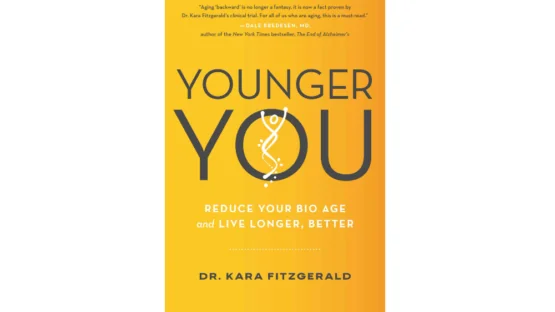Dr. Kara Fitzgerald’s new book provides an evidence-based approach to diet and lifestyle that aims to reduce your biological age.
Beginning with epigenetics
Younger You offers a pragmatic and easily understood primer on the role of epigenetics and aging along with an exquisitely detailed plan for how to reduce your biological age. This book is based on refreshingly solid science: the results of an eight-week randomized clinical trial, overseen by Dr. Fitzgerald, that was published in the peer-reviewed journal Aging in April 2021. Participants experienced an average reduction in biological age of 3.23 years over the course of eight weeks as determined using DNAmAge, an epigenetic clock developed by Dr. Steve Horvath of UCLA.
Dr. Fitzgerald has divided Younger You into three parts. Part 1 starts with a basic, foundational explanation of epigenetic change as it relates to chronological and biological aging. She then stresses the need to understand that we can influence how and when these changes occur through scientifically validated lifestyle interventions.
The latter half of this part highlights a case study that illustrates the strategic use of methyl donors, DNA adaptogens, and lifestyle changes: the three pillars of Dr. Fitzgerald’s approach to slowing the advancement of biological age. The first part winds down with a brief history of nutrient-based medicine and a cautionary tale that points to the hazards of isolated nutrient supplementation in favor of a whole foods-based approach to diet. Lastly, Dr. Fitzgerald argues the advantages of the Younger You diet over other longevity-based dietary approaches, such as intermittent fasting and the Mediterranean diet.
A plan to reverse biological age
The second part gets down to the brass tacks of Fitzgerald’s program to reverse biological age. The first chapter opens with a series of assessments, including a Biological Age Self-Assessment (BASA), a Medical Symptoms Questionnaire, and a brief guide to assessing blood work for clues to biological age. These assays provide enough baseline information metrics to gauge progress over eight weeks of using the Younger You diet and lifestyle approach. Next, Dr. Fitzgerald introduces the Younger You Intensive Program. This is the program that the study participants followed.
This eating plan is rich in methyl donors and DNA adaptogens. The mainstay of the diet is dark leafy greens, cruciferous vegetables, and a rainbow of antioxidant-rich vegetables. The bulk of calories come from nuts, seeds, and high-quality oils with modest amounts of high-quality organic animal proteins. Putting these components together yields a keto-leaning diet that is high in fiber and low in sugar.
It consists of roughly 45-50% fat, 15-20% protein, and 30-35% carbs. The amount of protein is 0.66 grams per kilogram of body weight for individuals under 60 years of age; For older individuals 1-1.2 grams per kilogram are prescribed. Organic is encouraged but not mandated, lentils and dairy are largely absent due to their inflammatory potential, and a 12-hour eating window is implemented to capture the benefits of intermittent fasting. In addition to specific guidelines and tables for making food selections, specific menus are also provided for a more scripted approach. Dr. Fitzgerald also provides specific guidelines for vegans and vegetarians.
Dr. Fitzgerald also provides guidance for tweaking the Younger You diet. Technically, the diet already meets the requirements of a paleo diet, and with minor modifications it can be layered into a number of other popular diets.
The Everyday Eating Plan
Following the introduction and details of the Intensive Younger You Diet, an Everyday Eating Plan is also presented. This plan is designed for people who don’t necessarily need the intensive plan and would prefer more flexibility in their daily food choices.
Dr. Fitzgerald also addresses other lifestyle factors including exercise, stress management, and sleep. Program participants are strongly encouraged to engage in enjoyable physical activities at least five days a week that lead to 60-80% of perceived maximum exertion. The importance of stress management is discussed, and engaging in techniques for managing stress, such as meditation, twice a week is recommended. Dr. Fitzgerald also covers the basics of sleep hygiene. Chapter 8 covers supplement support for regular program participants as well as vegetarians and vegans.
Putting the “You” in Younger You
Part three addresses customization for different life stages, including pregnancy and menopause, along with concerns related to genetic testing before moving on to recipes. About 100 pages of recipes are included in addition to several useful appendices, including shopping lists, ingredient notes, nutrient references, a primer on the methylation cycle, and a list of additional resources to round things out.





